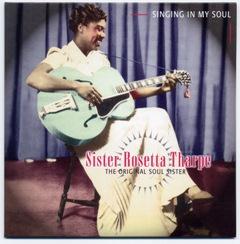Sister Rosetta Tharpe - The Original Soul Sister. This Train (2002)
Sister Rosetta Tharpe - The Original Soul Sister. This Train (2002)

4.1 God's Mighty Hand 2:53 4.2 The Lord Followed Me 3:10 4.3 This Train 2:47 4.4 Oh, When I Come To The End Of My Journey 2:56 4.5 Didn't Rain 2:36 4.6 Stretch Out 2:42 4.7 This Train 2:40 4.8 When I Come To The End Of My Journey 2:39 4.9 Beams Of Heaven 2:39 410 Up Above My Head I Hear Music In The Air 2:30 4.11 My Journey To The Sky 3:10 4.12 Teach Me To Be Right 2:45 4.13 I Heard My Mother Call My Name 2:44 4.14 Heaven Is Not My Home 2:40 4.15 The Natural Facts 3:13 4.16 Ain't No Grave Hold My Body Down 2:52 4.17 Lay Down Your Soul 2:24 4.18 Precious Memories 2:51 4.19 Family Prayer 2:39 4.20 Down By The Riverside 2:29 4.21 Were You There When They Crucified My Lord ? 3:14
On October 16th, 1973, Sister Rosetta Tharpe, one of gospel music's first and greatest stars, died from a blood clot on her brain at the age of 58. She did not depart from the world with the glamour and drama that she had lived in it. When she died, she was memorialized with only a fraction of the fanfare befitting her stature and was buried in a unmarked grave in the Northwood Cemetery in the northern outskirts of Philadelphia. Though she had played her music for hundreds of thousands of people, sold volumes of records, toured internationally as an American gospel master, and in the process permanently changed the face of gospel and rock music, she quickly began to fade from popular cultural memory.
But not forever. At the beginning of the new millennium, Sister Rosetta Tharpe began a startling posthumous second act in literate American pop culture. On September 11, 2001, Bob Dylan released his thirty-first album, Love and Theft. Throughout the record, a sly, roguish paean to American blues, gospel, and riverboat music, Dylan quotes liberally from a number of his musical heroes, including Sister Rosetta Tharpe, whose version of the Gene Austin song, "The Lonesome Road," can be heard in the melody, lyrics, and delivery of the apocalyptic last track, "Sugar Baby." Just weeks after this, in October 2001, American audiences were enthralled by Jean-Pierre Jeunet's film Amelie.In the film, one of Amelie's friends watches a full-screen, thirty-second clip of Sister Rosetta Tharpe at the peak of her powers performing her incendiary gospel music in 1962 on the influential show TV Gospel Time. The year 2002 saw the release of both a four-disc, eighty-one track box set called Sister Rosetta Tharpe: The Original Soul Sister, on the U.K. label Proper Records, and the inception of a now nearly complete edition of Sister Rosetta Tharpe's recordings on the French label, Fremeaux and Associates. ---h-net.org
download (mp3 @320 kbs):
yandex mediafire ulozto gett bayfiles








